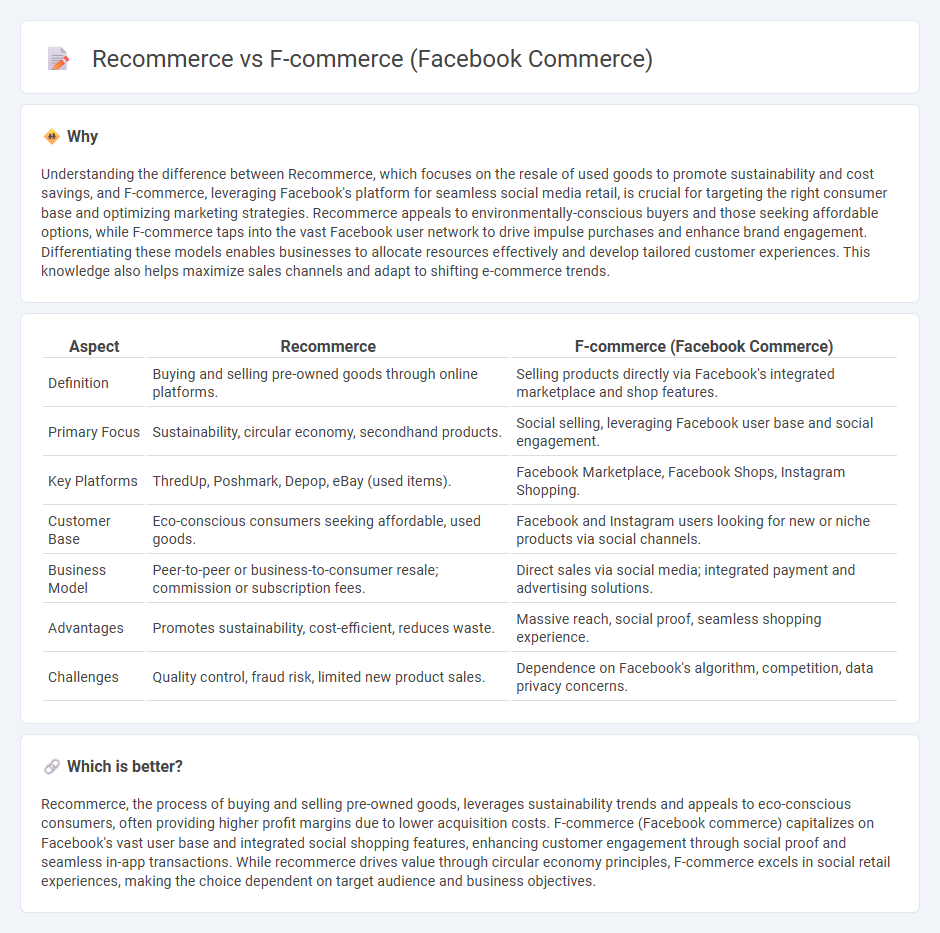
Recommerce focuses on buying and selling pre-owned goods through online platforms, emphasizing sustainability and cost savings, while F-commerce leverages Facebook's social media ecosystem for seamless shopping experiences integrated with social interactions. Both models capitalize on digital trends but target different consumer behaviors and market dynamics. Explore how these commerce strategies are transforming the retail landscape.
Why it is important
Understanding the difference between Recommerce, which focuses on the resale of used goods to promote sustainability and cost savings, and F-commerce, leveraging Facebook's platform for seamless social media retail, is crucial for targeting the right consumer base and optimizing marketing strategies. Recommerce appeals to environmentally-conscious buyers and those seeking affordable options, while F-commerce taps into the vast Facebook user network to drive impulse purchases and enhance brand engagement. Differentiating these models enables businesses to allocate resources effectively and develop tailored customer experiences. This knowledge also helps maximize sales channels and adapt to shifting e-commerce trends.
Comparison Table
| Aspect | Recommerce | F-commerce (Facebook Commerce) |
|---|---|---|
| Definition | Buying and selling pre-owned goods through online platforms. | Selling products directly via Facebook's integrated marketplace and shop features. |
| Primary Focus | Sustainability, circular economy, secondhand products. | Social selling, leveraging Facebook user base and social engagement. |
| Key Platforms | ThredUp, Poshmark, Depop, eBay (used items). | Facebook Marketplace, Facebook Shops, Instagram Shopping. |
| Customer Base | Eco-conscious consumers seeking affordable, used goods. | Facebook and Instagram users looking for new or niche products via social channels. |
| Business Model | Peer-to-peer or business-to-consumer resale; commission or subscription fees. | Direct sales via social media; integrated payment and advertising solutions. |
| Advantages | Promotes sustainability, cost-efficient, reduces waste. | Massive reach, social proof, seamless shopping experience. |
| Challenges | Quality control, fraud risk, limited new product sales. | Dependence on Facebook's algorithm, competition, data privacy concerns. |
Which is better?
Recommerce, the process of buying and selling pre-owned goods, leverages sustainability trends and appeals to eco-conscious consumers, often providing higher profit margins due to lower acquisition costs. F-commerce (Facebook commerce) capitalizes on Facebook's vast user base and integrated social shopping features, enhancing customer engagement through social proof and seamless in-app transactions. While recommerce drives value through circular economy principles, F-commerce excels in social retail experiences, making the choice dependent on target audience and business objectives.
Connection
Recommerce leverages the resale of pre-owned goods, driving sustainable consumption trends, while F-commerce integrates social media platforms like Facebook to facilitate seamless buying and selling experiences. The connection lies in F-commerce providing a dynamic marketplace and targeted audience access that accelerates the growth of recommerce by enabling users to discover, promote, and transact secondhand products efficiently. This synergy enhances digital commerce ecosystems by combining social interaction with sustainable economic practices.
Key Terms
F-commerce (Facebook commerce):
F-commerce leverages Facebook's extensive user base and integrated shopping features to enable seamless social shopping experiences directly within the platform, driving higher engagement and conversion rates. It utilizes targeted advertising, social proof through reviews and shares, and AI-driven product recommendations to personalize the customer journey. Explore how F-commerce strategies can revolutionize your online retail and boost sales in today's digital economy.
Social Selling
F-commerce leverages Facebook's vast user base and integrated shopping features to facilitate seamless social selling experiences, enabling brands to reach and engage customers directly within the platform. Recommerce emphasizes sustainability by promoting the resale of pre-owned goods through social channels, capitalizing on growing consumer demand for eco-friendly shopping alternatives. Explore how these distinct social selling strategies can optimize your digital sales approach.
Facebook Shops
F-commerce leverages Facebook Shops to enable brands to create immersive storefronts directly on the platform, streamlining the purchase process with integrated payment and seamless social interactions. Recommerce emphasizes the resale of pre-owned or refurbished goods, using Facebook Shops as a marketplace for sustainable shopping and circular economy models. Explore how businesses optimize Facebook Shops for both new product sales and recommerce opportunities to boost engagement and revenue.
Source and External Links
What is Facebook f-commerce and how does it work? - Easymailing - F-commerce is the sale of products and services directly on Facebook, enabling users to view, purchase, and manage orders within the platform through features like product displays, Marketplace, ads, and integrated payment systems.
Introduction to Facebook Commerce - Carlose Lopez - F-commerce is a form of social commerce that facilitates sales transactions on Facebook, leveraging the platform's vast user base to drive customer acquisition, loyalty, and advocacy.
What is Facebook Commerce (F-Commerce)? - Webopedia - F-commerce involves creating Facebook storefronts or applications that allow online retailers to sell products within Facebook, either via custom apps or third-party shopping applications integrated into Facebook Business Pages.
 dowidth.com
dowidth.com